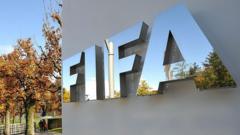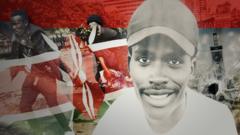Many professional women's football players are calling for football governing body FIFA to abandon its sponsorship deal with Saudi oil company Aramco, alleging it undermines the values they aspire to uphold.
Women Footballers Demand FIFA to Cut Ties with Saudi Oil Sponsorship

Women Footballers Demand FIFA to Cut Ties with Saudi Oil Sponsorship
Over 100 female athletes advocate for a shift in sponsorship to uphold integrity in women's football.
More than 100 professional women footballers, including players from 24 countries, have rallied together in a powerful open letter directed at FIFA, urging the organization to terminate its controversial sponsorship agreement with the Saudi oil giant, Aramco. The sponsorship, set to extend until 2027, grants the state-owned enterprise significant marketing rights for the men’s World Cup in 2026, as well as the Women’s World Cup in 2027. The players argue that associating with a company linked to environmental degradation and human rights abuses is not only damaging but counterproductive to the inclusive message FIFA professes to support.
The letter gathers support from players with a total of over 2,300 international caps, including standout figures like Manchester City striker Vivianne Miedema and England defender Niamh Charles. Miedema highlighted the responsibilities that women footballers have in shaping future generations, stating, "This sponsorship does not align with what we as women footballers stand for." The players have emphasized that their message echoes a deep-rooted concern for both humanitarian and environmental issues.
Despite the outcry, FIFA has responded by reaffirming the value of its partnership with Aramco, stressing that sponsorship revenue is intended to reinvest into women's football development at all levels. FIFA's justification for the ongoing deal comes amid growing scrutiny of Saudi Arabia's investment in sports, a strategy often criticized as 'sportswashing' — an attempt to enhance its global image while diverting attention from its human rights violations, including issues surrounding women's rights and LGBTQ+ rights.
Aramco, while not commenting on the letter directly, has previously defended its environmental initiatives by claiming a lower climate impact compared to competitors. Yet, activists and athletes alike contend that the company’s reputation as the world’s largest corporate greenhouse gas emitter starkly contradicts its claims, raising questions about the integrity of its sponsorship.
Danish player Sofie Junge Pedersen, who was instrumental in drafting the letter, condemned the sponsorship as "worse than an own goal," asserting that women’s football "deserves better." She further suggested the establishment of a committee inclusive of player representation to oversee sponsorship choices more aligned with gender equality and human rights principles.
As tensions remain high, Miedema warned that the continued presence of Aramco as a World Cup sponsor may provoke significant backlash, potentially leading to player boycotts similar to recent protests by women's teams in other countries. With discussions surrounding sponsorship ethicality gaining momentum, FIFA finds itself at a crossroads, challenged by the powerful voices of its players who are increasingly unwilling to compromise their values for commercial gain.
In response to calls for greater player representation in decision-making, FIFA stated that it is in the process of establishing committees dedicated to women's football, although these structures have yet to play a role in the ongoing Aramco partnership discussions. The situation underlines the need for sports organizations to align their partnerships with ethical values that resonate with the ideals of the sports they represent.
The letter gathers support from players with a total of over 2,300 international caps, including standout figures like Manchester City striker Vivianne Miedema and England defender Niamh Charles. Miedema highlighted the responsibilities that women footballers have in shaping future generations, stating, "This sponsorship does not align with what we as women footballers stand for." The players have emphasized that their message echoes a deep-rooted concern for both humanitarian and environmental issues.
Despite the outcry, FIFA has responded by reaffirming the value of its partnership with Aramco, stressing that sponsorship revenue is intended to reinvest into women's football development at all levels. FIFA's justification for the ongoing deal comes amid growing scrutiny of Saudi Arabia's investment in sports, a strategy often criticized as 'sportswashing' — an attempt to enhance its global image while diverting attention from its human rights violations, including issues surrounding women's rights and LGBTQ+ rights.
Aramco, while not commenting on the letter directly, has previously defended its environmental initiatives by claiming a lower climate impact compared to competitors. Yet, activists and athletes alike contend that the company’s reputation as the world’s largest corporate greenhouse gas emitter starkly contradicts its claims, raising questions about the integrity of its sponsorship.
Danish player Sofie Junge Pedersen, who was instrumental in drafting the letter, condemned the sponsorship as "worse than an own goal," asserting that women’s football "deserves better." She further suggested the establishment of a committee inclusive of player representation to oversee sponsorship choices more aligned with gender equality and human rights principles.
As tensions remain high, Miedema warned that the continued presence of Aramco as a World Cup sponsor may provoke significant backlash, potentially leading to player boycotts similar to recent protests by women's teams in other countries. With discussions surrounding sponsorship ethicality gaining momentum, FIFA finds itself at a crossroads, challenged by the powerful voices of its players who are increasingly unwilling to compromise their values for commercial gain.
In response to calls for greater player representation in decision-making, FIFA stated that it is in the process of establishing committees dedicated to women's football, although these structures have yet to play a role in the ongoing Aramco partnership discussions. The situation underlines the need for sports organizations to align their partnerships with ethical values that resonate with the ideals of the sports they represent.



















